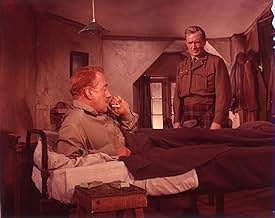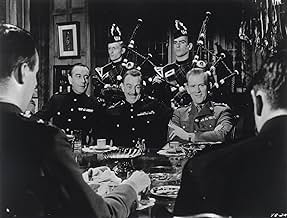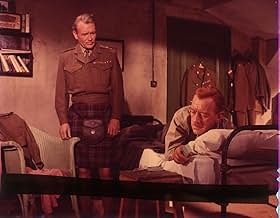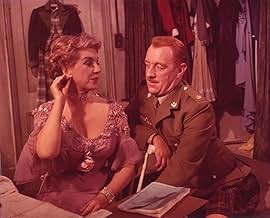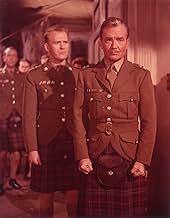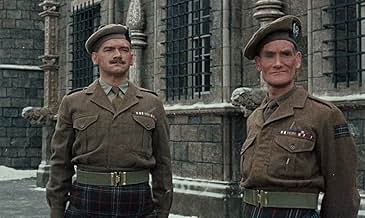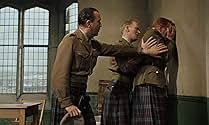Aggiungi una trama nella tua linguaAfter World War II, a Highland Regiment's acting Commanding Officer, who rose from the ranks, is replaced by a peace-time Oxford-educated Commanding Officer, leading to a dramatic conflict b... Leggi tuttoAfter World War II, a Highland Regiment's acting Commanding Officer, who rose from the ranks, is replaced by a peace-time Oxford-educated Commanding Officer, leading to a dramatic conflict between the two.After World War II, a Highland Regiment's acting Commanding Officer, who rose from the ranks, is replaced by a peace-time Oxford-educated Commanding Officer, leading to a dramatic conflict between the two.
- Candidato a 1 Oscar
- 2 vittorie e 7 candidature totali
Recensioni in evidenza
I've heard of this movie for a long time, and knew that it was well-liked (Guinness considered it one of his best performances), but it wasn't what I was expecting. It's a psychological study of these two men, and, with the Barrow character, an early examination of PTSD before it was called that (he was a P. O. W. In a Japanese camp, and was tortured). The accents can be a bit much, and if you don't like bagpipes, this is definitely not the movie for you, but I thought the acting was terrific, and the slow-burn drama builds to a shattering conclusion.
The more I watch this film, the more I appreciate the wealth of detailed characterization it contains. On Barrow's first meeting with the officers of the regiment, as he is introduced to the rotund Major "Dusty" Miller, note John Mills' quick downward glance of disapproval at the Major's corpulent gut. In the following scene, where Jock Sinclair offers Barrow a whiskey, Barrow courteously replies that whiskey does not agree with him, to Jock's dismay. We later learn that Barrow is emotionally unstable, has problems controlling his rage, and that his family life has broken up. Could alcoholism be an issue, explaining his aversion to whiskey? While Guinness and Mills are justly praised, I find the performance by Dennis Price as Major Charlie Scott to be very interesting as well. Bringing to mind Ralph Richardson, he exudes an oily, genteel but detached sort of upper-crust English manner that Colonel Sinclair gleefully mocks ("old boy, old boy, old boy"). When RSM Riddick (Percy Herbert, distractingly bringing to mind Michael Palin in appearance and exaggerated military manner) tries to officially express the doubts of those in his own strata in the military hierarchy about the prosecution of Jock Sinclair, Barrow's first reaction is curiously bemused and sarcastic ("you astonish me"). Barrow subsequently snaps into martinet mode and brusquely dismisses Riddick's petition. His initial bemusement, though, is telling in that his instinct is not to take this man, from a lower level of the social and military hierarchy, seriously at all, treating him almost as an unruly child who needs be put in his place. Having seen power struggles, personality clashes, and class divisions like this in my work experience, I see that this all rings true. As foreign, exotic, and strange as the setting, characters, and language are to an American like me, the themes of this story are so universal that they can be immediately appreciated by almost anyone who's experienced life to some degree.
As for the language, it's a delight to finally have a DVD with English subtitles to clarify some of the spoken lines. The picture, by the way, is excellent on the new DVD, except for the intermittent appearance of a dark streak down the right side of the screen near the end of the film. I would have thought this could be fixed with digital restoration, but the cost of that might have been prohibitive, and though a little distracting, it really doesn't spoil my enjoyment. I think it's fitting that there are no negative reviews here thus far.
The book is a slim volume, but is fast moving and full of character. Set in provincial Scotland, the flavour of the film is as strong as the novel (by James Kennaway who also wrote the screenplay) but the characterisation by the actors builds on and then surpasses the script. I note that neither of the actors is Scottish and this amazes me. Maybe I should seek advice from a Scot on this matter.
We never leave the barracks or the quiet army town and so learn only by rumour how Jock Sinclair, on some blasted field at the centre of El Alamein saved his regiment and turned the battle. Half the officers and men were dead, the cause lost, yet his spirit and the force of his will brought him a battlefield promotion to acting colonel. The Regiment is what he lives for.
Several years later, in peacetime, the army catches up with its paperwork and sends a proper officer to take back the reins. Basil Barrow arrives unexpectedly from a desk job and Sandhurst. His assignment is to organise and civilise the men, long gone wild under Jock's supervision. John Mills plays the rather impotent lonely Barrow as an accentless and educated man. There are "dark rumours" amongst the men that he may be English.
The clash between the two men commences immediately on their meeting and ends in scenes of mourning and redemption.
This is an actors film. There are few effects and much of the action is centred on one or the other of Guinness or Mills. Sinclair is a piper, this gives him an almost spiritual air and his feel for music (the Tunes of Glory) is the first area of contention between the two Colonels. When Jock leads his men in a wild and unruly reel with arms flailing and much shouting and yipping at a society ball the ensuing fit from the uptight and conservative Mills is wonderful. He trembles and shakes and we do likewise.
The film builds and builds to a finale full of Tunes of Glory and we come to an understanding about both men, as they come to understand each other.
Working from a tight, intelligent screenplay by James Kennaway (adapted from his own novel), Neame delivers a taut, insightful character driven drama that explores the diversity of human nature, and illustrates the good and evil contained within us all and the traits which ultimately determine which will be the prevalent manifestation of the individual personality. Through the device of placing the protagonist and the antagonist-- each the antithesis of the other-- in a no-win situation, the film examines motivations, actions and reactions that can lead the story in any number of directions, none of which are positive, but all of which are logical and which finally leads to a conclusion that is extremely powerful, incisive and totally believable.
As Jock Sinclair, you see Alec Guinness in a role quite unlike anything else he's ever done; it was, in fact, his own personal favorite of all of his cinematic creations. Sinclair is a man who is course and rough-hewn, an egoist who, when the personal need arises, will wantonly subject those around him to psychological cruelty in order to elevate himself and his position and to assuage his own ego. At mess, for example, he derides a young officer for not smoking his cigarette like a man; he orders every `man' to drink whiskey, implying that to do otherwise constitutes an assessment of an individual's masculinity. Boisterous bravura and ribald behavior are his tools of navigation through life, coupled with an attitude of doing things his way or the wrong way. And Guinness plays it to the hilts. Beginning with his whole perspective and attitude, he IS Sinclair, while physically he embodies and expresses exactly who this man is and what he stands for. At times, his eyes fairly bulge with an enthusiasm that suggests a lasciviousness underlying the cruelty; when he walks he strides purposefully, and carries himself in such a way that when he enters a room he veritably fills it and makes his presence felt so that the very air seems oppressed by him. It's a performance that, even in a strong year of Oscar contenders (Trevor Howard, Lancaster, Lemmon, Olivier and Tracy were all up for Best Actor-- Lancaster won) he deserved to be among them. In this film Guinness is quite simply unforgettable in one of his most powerful roles.
John Mills, as well, delivers a superb, introspective performance as Barrow, capturing the way in which this man must live so inwardly to survive, and conveying how difficult it is for him to continue on while attempting to live up to his heritage and the expectations of a position to which he is clearly unfit in his current mental state. In Barrow we see reflected the prevailing attitude of the times that `might makes right,' and that anything less is akin to unacceptable negligence, that same military mind-set that put Jake Holman at odds with the world in `The Sand Pebbles,' and led to the unfortunate incident depicted so eloquently in `A Few Good Men.' It's an excellent, understated, sensitive performance by Mills, who plays brilliantly off of Guinness's brutishness.
The film also boasts a number of excellent supporting performances, especially Dennis Price, as Major Charlie Scott, whose stoic assessment of himself as well as the situation at hand serves as the film's conscience; Gordon Jackson as the sympathetic Captain Jimmy Cairns; and Duncan Macrae in a memorable turn as Pipe Major Duncan MacLean.
Also included in this outstanding supporting cast are Kay Walsh (Mary), John Fraser (Ian), Susannah York (In her film debut as Morag Sinclair), Percy Herbert (Riddick), Allan Cuthbertson (Eric) and Angus Lennie (Orderly). A powerful film that so successfully demonstrates the devastating effects of dysfunctional human relationships and conveys the need to look beyond ourselves, `Tunes of Glory' presents a story to which everyone will be able to relate because the theme is applicable to any setting involving human interactions. A thoroughly involving film featuring a number of memorable performances (especially by Guinness) that will give you reason to take pause and reflect, and hopefully add some perspective to a world too often mired in unnecessary turmoil. I rate this one 10/10.
Lo sapevi?
- QuizSir Alec Guinness was offered the role of Lieutenant Colonel Barrow, but asked for the role of Major Sinclair instead. He then suggested Sir John Mills for the other role.
- BlooperPipe Major MacLean is never shown with a set of bagpipes. In particular, he is a mere observer at band practice. A pipe major is not only the leader of the band but also its chief instructor, and it is unthinkable that he would not play an active role in all practices.
- Citazioni
Major Jock Sinclair, D.S.O., M.M.: We're on a first name basis in this regiment. Your first name is Derek. My first name is Major.
- ConnessioniFeatured in Film Extra: Alec Guiness (1973)
I più visti
- How long is Tunes of Glory?Powered by Alexa
Dettagli
- Data di uscita
- Paese di origine
- Lingua
- Celebre anche come
- Tunes of Glory
- Luoghi delle riprese
- Stirling Castle, Stirling, Scozia, Regno Unito(establishing shots)
- Aziende produttrici
- Vedi altri crediti dell’azienda su IMDbPro
- Tempo di esecuzione1 ora 47 minuti
- Colore
- Proporzioni
- 1.66 : 1
Contribuisci a questa pagina



